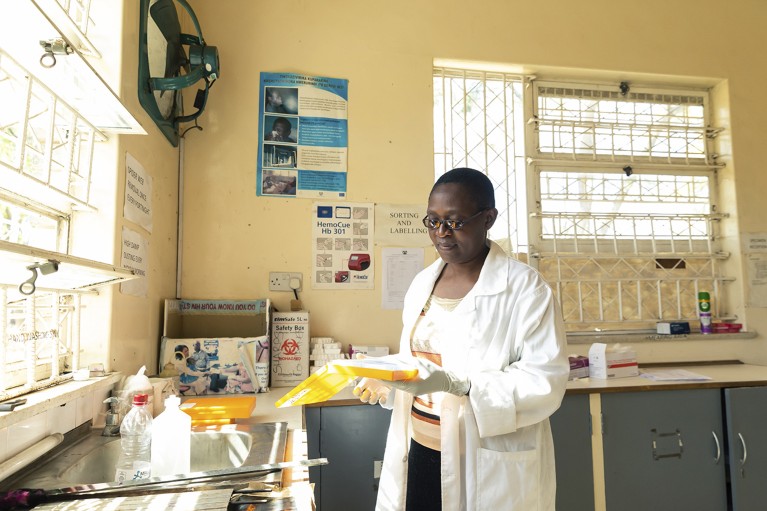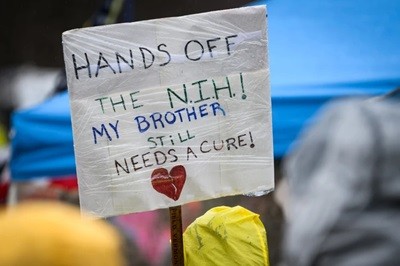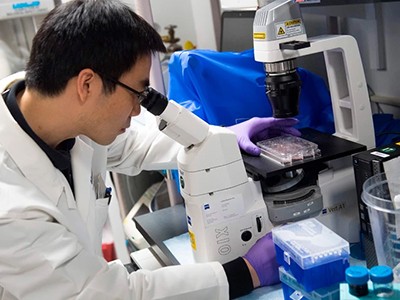NIH grant cuts will axe clinical trials abroad — and could leave thousands without care


Diseases caused by HIV and drug-resistant tuberculosis could surge globally as a result of research-grant cuts made by the US National Institutes of Health.
Credit: Jekesai Njikizana/AFP via Getty
Amita Gupta has spent more than a decade planning and running a US$70-million trial to study a new tuberculosis drug, enrolling nearly 6,000 participants across 13 countries. It might all have been for nothing.
Gupta’s trial has been ensnared by a US National Institutes of Health (NIH)
policy announced on 1 May that bans ‘foreign subawards’
, which are
funds that a US grant recipient can give to an international collaborator
to help complete a project. Since the policy was disclosed, NIH employees have been forbidden from issuing grants involving such awards, according to internal documents that
Nature
has obtained.
As a result, funding will abruptly cease for dozens, if not hundreds, of ongoing trials of experimental drugs and treatments. The change puts thousands of trial participants, as well as the scientists running the trials, in limbo. Gupta, an infectious-diseases specialist at Johns Hopkins University in Baltimore, Maryland, says she will have to start winding down her trial on 1 June unless she finds alternative funding.
NIH killed grants on orders from Elon Musk’s DOGE
To understand the policy’s impact,
Nature
spoke to nine affected researchers who have been scrambling to find funding quickly to avoid shutting down their work. On top of the impact on research, scientists say that the policy could do tremendous harm to trial participants, who might suddenly find themselves without care. And it is a waste of taxpayers’ money, says Amy Conroy, a behavioural scientist at the University of California, San Francisco, who is studying the effectiveness of a programme in Malawi to reduce alcohol use in
people with HIV
.
“This trial is the product of five years of formative work that American taxpayers have invested in, and they will never know the results of this study that they’ve paid for,” says Conroy, whose grant supporting this programme has a foreign subaward.
The NIH, which has cited national security concerns and a lack of transparency as the rationale for the change, did not respond to
Nature
’s queries about the policy, its impacts on clinical trials or scientists’ frustrations. The NIH has said that direct funding for foreign sites will not be affected and that it will announce an alternative funding mechanism by October.
Collateral damage
The NIH
is the world’s largest public funder of biomedical research
, and typically gives multi-year awards that are doled out in one-year increments contingent on researchers making reasonable progress. The new policy, which took effect on the day it was announced, requires that ongoing projects that include foreign subawards will no longer receive funding when they come up for their next allotment.
This affects a large chunk of the agency’s portfolio: in 2024, the NIH funded about 1,800 projects with a combined value of more than $10 billion that include at least one foreign subaward, according to the US government website
USAspending.gov
.
Caught in the crossfire are participants of trials funded by these foreign subawards. Many are members of vulnerable populations, such as those living with HIV. If their trials end, they will lose access to treatments and care.
NIH turmoil sparks anxiety over future of its global grants
“You can imagine how a participant from rural Africa is going to feel one day when they realize we have disappeared, we’ve gone back to the US and we’ve collected all this information about them,” Conroy says. “There’s the potential for medical mistrust and anti-democratic beliefs to flourish.”
That scenario worries grantees such as Prasanna Jagannathan, a malaria epidemiologist at Stanford University in California. Since 2022, he and his colleagues have been running a trial involving nearly 1,000 infants in Uganda to test a drug cocktail that could boost
immunity to malaria
. The researchers administered the drugs monthly for up to two years. Now the trial is in a crucial phase: after participants stop taking the drug, the scientists will monitor them for infection.
There’s a possibility that, post-treatment, malaria cases will be more serious than if the children had not received the therapy, because participants were not infected with the disease naturally while they were taking the drugs. “If we put them at an increased risk by giving them this drug, we’re obligated to continue to provide care for them,” Jagannathan says. “That’s what they signed up for.”
Conroy fears that she could face disciplinary action from the Malawi government for abandoning participants in the middle of a trial. “They don’t care why it was pulled — they just know this was not ethical.”
Join the queue
The NIH says it will allow research projects involving human participants to receive limited funds for “orderly shutdowns”, but researchers who spoke to
Nature
were unclear on what this means or how much funding is available for this purpose. And their
other options
are limited.








